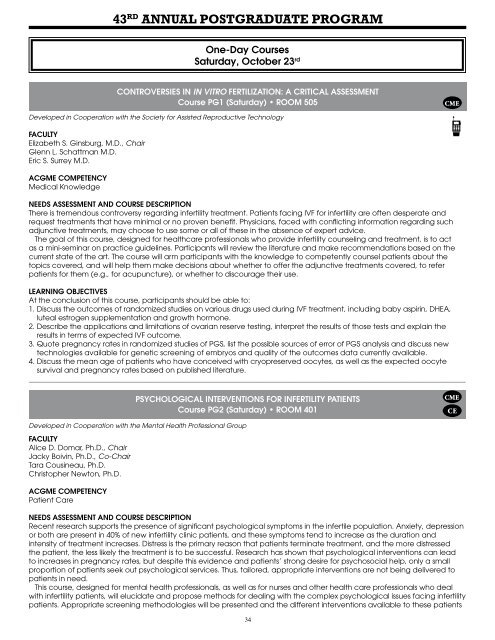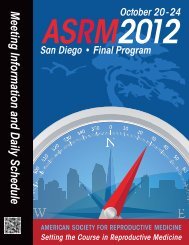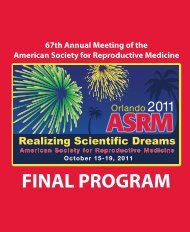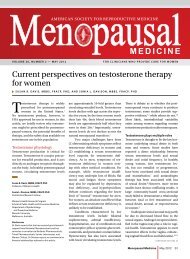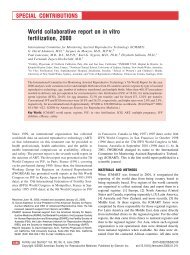scientific program • symposia - American Society for Reproductive ...
scientific program • symposia - American Society for Reproductive ...
scientific program • symposia - American Society for Reproductive ...
You also want an ePaper? Increase the reach of your titles
YUMPU automatically turns print PDFs into web optimized ePapers that Google loves.
43 RD ANNUAL POSTGRADUATE PROGRAM<br />
Developed in Cooperation with the <strong>Society</strong> <strong>for</strong> Assisted <strong>Reproductive</strong> Technology<br />
FACULTY<br />
Elizabeth S. Ginsburg, M.D., Chair<br />
Glenn L. Schattman M.D.<br />
Eric S. Surrey M.D.<br />
ACGME COMPETENCY<br />
Medical Knowledge<br />
NEEDS ASSESSMENT AND COURSE DESCRIPTION<br />
There is tremendous controversy regarding infertility treatment. Patients facing IVF <strong>for</strong> infertility are often desperate and<br />
request treatments that have minimal or no proven benefit. Physicians, faced with conflicting in<strong>for</strong>mation regarding such<br />
adjunctive treatments, may choose to use some or all of these in the absence of expert advice.<br />
The goal of this course, designed <strong>for</strong> healthcare professionals who provide infertility counseling and treatment, is to act<br />
as a mini-seminar on practice guidelines. Participants will review the literature and make recommendations based on the<br />
current state of the art. The course will arm participants with the knowledge to competently counsel patients about the<br />
topics covered, and will help them make decisions about whether to offer the adjunctive treatments covered, to refer<br />
patients <strong>for</strong> them (e.g., <strong>for</strong> acupuncture), or whether to discourage their use.<br />
LEARNING OBJECTIVES<br />
At the conclusion of this course, participants should be able to:<br />
1. Discuss the outcomes of randomized studies on various drugs used during IVF treatment, including baby aspirin, DHEA,<br />
luteal estrogen supplementation and growth hormone.<br />
2. Describe the applications and limitations of ovarian reserve testing, interpret the results of those tests and explain the<br />
results in terms of expected IVF outcome.<br />
3. Quote pregnancy rates in randomized studies of PGS, list the possible sources of error of PGS analysis and discuss new<br />
technologies available <strong>for</strong> genetic screening of embryos and quality of the outcomes data currently available.<br />
4. Discuss the mean age of patients who have conceived with cryopreserved oocytes, as well as the expected oocyte<br />
survival and pregnancy rates based on published literature.<br />
________________________________________________________________________________________________________________________<br />
Developed in Cooperation with the Mental Health Professional Group<br />
FACULTY<br />
Alice D. Domar, Ph.D., Chair<br />
Jacky Boivin, Ph.D., Co-Chair<br />
Tara Cousineau, Ph.D.<br />
Christopher Newton, Ph.D.<br />
ACGME COMPETENCY<br />
Patient Care<br />
One-Day Courses<br />
Saturday, October 23 rd<br />
CONTROVERSIES IN IN VITRO FERTILIZATION: A CRITICAL ASSESSMENT<br />
Course PG1 (Saturday) <strong>•</strong> ROOM 505<br />
PSYCHOLOGICAL INTERVENTIONS FOR INFERTILITY PATIENTS<br />
Course PG2 (Saturday) <strong>•</strong> ROOM 401<br />
NEEDS ASSESSMENT AND COURSE DESCRIPTION<br />
Recent research supports the presence of significant psychological symptoms in the infertile population. Anxiety, depression<br />
or both are present in 40% of new infertility clinic patients, and these symptoms tend to increase as the duration and<br />
intensity of treatment increases. Distress is the primary reason that patients terminate treatment, and the more distressed<br />
the patient, the less likely the treatment is to be successful. Research has shown that psychological interventions can lead<br />
to increases in pregnancy rates, but despite this evidence and patients’ strong desire <strong>for</strong> psychosocial help, only a small<br />
proportion of patients seek out psychological services. Thus, tailored, appropriate interventions are not being delivered to<br />
patients in need.<br />
This course, designed <strong>for</strong> mental health professionals, as well as <strong>for</strong> nurses and other health care professionals who deal<br />
with infertility patients, will elucidate and propose methods <strong>for</strong> dealing with the complex psychological issues facing infertility<br />
patients. Appropriate screening methodologies will be presented and the different interventions available to these patients<br />
34<br />
CME<br />
CME<br />
CE


